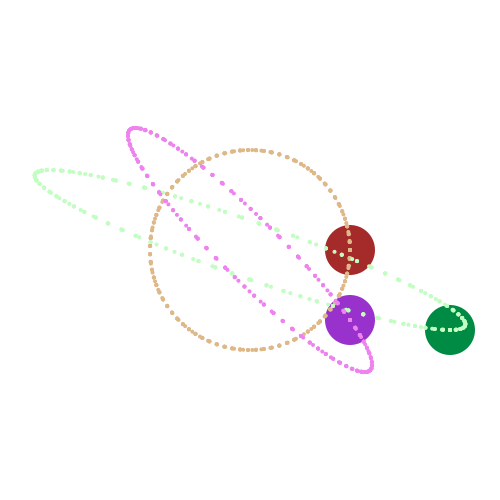Kinetic is a computational fluid dynamics toolbox written in 
The ecosystem follows the modular design philosophy. Depending on the specific use case, the main module is split into portable components to reduce the lantency caused by the LLVM just-in-time compiler:
- KitBase: physical models and numerical schemes
- KitML: neural models and machine learning methods
- KitFort: optional high-performance Fortran backend
- FluxReconstruction: high-fidelity solution algorithms
- Langevin: intrusive uncertainty quantification methods
- KitAMR: large-scale distributed computing facilities
- kineticpy: Python interface built on top of pyjulia
Kinetic is a registered package in the official Julia package registry.
We recommend installing it with the Julia package manager.
From the Julia REPL, you can get in the package manager (by pressing ]) and add the package
julia> ]
(v1.10) pkg> add KineticThis will automatically install a currently stable release and all its dependencies.
Kinetic models and simulates fluid dynamics problems from the perspective of particle transport. Any advection-diffusion-type equation of different particles, including molecules, photons, plasmas, neutrons, etc., can be solved within the framework. Special attentions have been paid on Hilbert's sixth problem, i.e. to build the numerical passage between kinetic theory of gases, e.g. the Boltzmann equation, and continuum mechanics, e.g. the Euler and Navier-Stokes equations. A partial list of current supported models and equations include:
- Boltzmann equation
- radiative transfer equation
- Fokker-Planck-Landau equation
- direct simulation Monte Carlo
- advection-diffusion equation
- Burgers equation
- Euler equations
- Navier-Stokes equations
- Magnetohydrodynamical equations
- Maxwell's equations
The structure of Kinetic is shown in the schematic below:
flowchart LR
subgraph Com[Component]
KitBase
KitML
end
subgraph Backend
CPU
CUDA
end
subgraph Mesh
FiniteMesh
end
subgraph SciML[Scientific Machine Learning]
Solaris(Solaris)
Flux(Flux)
TensorFlow[TensorFlow]
end
subgraph AD[Automatic Differentiation]
ForwardDiff
Zygote
end
subgraph Parallel[Parallel Computing]
Threads
Distributed
MPI["MPI (experimental)"]
end
subgraph Serial[Serialization]
CSV
JLD2
BSON
end
subgraph Opt[Optimization]
Optimisers
Optim
Optimization
end
subgraph Ar[Array]
Array
StaticArrays
StructArrays
end
Kt(Kinetic)
Com --> Kt
Ar --> Kt
Mesh --> Kt
Backend --> Kt
AD --> Kt
Serial --> Kt
Kt --> Parallel
Kt --> SciML
Kt --> Opt
For the detailed implementation and usage of the package, please check the documentation:
If you benefit from Kinetic in your research, teaching, or otherwise, we would be happy if you could mention or cite it:
@article{xiao2021kinetic,
doi = {10.21105/joss.03060},
url = {https://doi.org/10.21105/joss.03060},
year = {2021},
publisher = {The Open Journal},
volume = {6},
number = {62},
pages = {3060},
author = {Tianbai Xiao},
title = {Kinetic.jl: A portable finite volume toolbox for scientific and neural computing},
journal = {Journal of Open Source Software}
}
Feel free to dive in! If you have any questions or ideas, please open an issue or submit pull requests. If you're new to the open source community and looking for a cool little project to work on that fits your interests, we're happy to help along the way.
MIT © Tianbai Xiao




